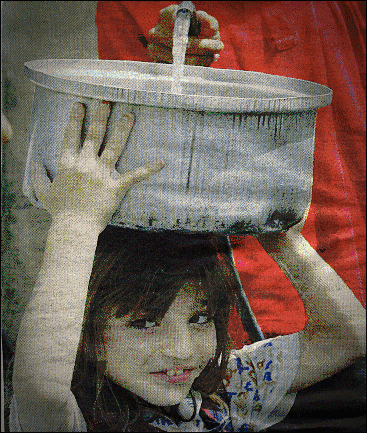Thou shalt not kill
Dato' Dzulkifli Abd Razak
Article
Comment - New Sunday Times - - 03/26/2006
WHEN in Hiroshima, a visit to the Peace Memorial Museum located at the city’s Peace Memorial Park is a must for all peace-loving people.
After all, this is the only place where one can experience the tragedy of the first nuclear holocaust some 60 years ago.
The exhibits at the Peace Memorial Park serve as a vivid reminder of the pain and suffering of the tragedy.
Based on official documents, Hiroshima was among the many cities earmarked as a potential target for the atomic bomb explosion. Later, it was singled out as the first target as there were no Allied prisoners of war there.
As a result, at precisely 8.15am on Aug 6, 1945, the city was annihilated by an A-bomb dubbed Little Boy, which was detonated some 600 metres above the city, killing instantly tens of thousands of civilians.
The mayor of Hiroshima city, in his speech to commemorate the 60th anniversary of the A-bombing last year, described it such: "A moment of lamentation in which more than 300 thousand souls of A-bomb victims and those who remain behind transcended the boundary between life and death."
He made the plea again by A-bomb survivors that no one else should ever suffer as they did, along with the cornerstone of all religions and bodies of law: "Thou shalt not kill."
And on Aug 6 last year, the "Year of Inheritance, Awakening and Commitment" was declared during which various campaigns for nuclear weapon abolition were launched.
Last week, just a stone’s throw away from the Peace Park, the Hiroshima Peace Institute of Hiroshima City University held an International Comparative Genocide and Mass Violence Research Project.
Attended by global experts on the subject, the project revisited the occurrence of mass violence and genocide worldwide with the view to ensure such tragedies will not be repeated.
Coincidentally, last week, too was the third anniversary of the invasion of Iraq where mass violence and genocide are almost everyday occurrences.

There is still a smile on this young Iraqi face despite the daily
ordeal of water shortages, power disruption, breakdown in sewage
services and other inconveniences.
A senior academic from a university in Iraq at the Hiroshima meeting talked about the situation in Iraq now.
This is what he said:
The situation today in Iraq is a desolate one. Less than two decades ago, Iraq was a thriving, growing country.
It was the most advanced Arab country in the region with huge mineral and oil wealth and an even bigger human wealth — full of educated, civilised people who were determined to make their country the best in the region.
The country, which was once one of the leading Arab countries in education, science, medicine and economic and social growth, is now only a shell of what it once was.
The changes, from two wars, led by America and Britain, and over 13 years of sanctions have been devastating. The infrastructure is seemingly damaged beyond repair with the most basic necessities unavailable.
Areas in Iraq’s capital and major cities have been receiving an average of four hours of electricity daily; the supply of drinking water is intermittent and security of the country is deplorable.
In several areas, there is partial or complete damage to the sewage system, leaving waste in the streets and at the doors of homes. And while billions of dollars are being spent to fortify the occupation government behind massive walls and to create permanent American bases, very little is being done to repair the extreme damage inflicted by two wars and a debacle of sanctions.
The situation for Iraqi scientists is the worst in the history of Iraqi, a country known as the cradle of civilisation and a promoter of science and knowledge.
Today, scholars and scientists are being assassinated and many have been driven out of the country by occupation forces and by the locals in power who do not want to see a stable, developed Iraq.
Doctors, lawyers, university professors and scientists are being abducted, and many have been forced into exile.
Iraq is suffering from a brain drain to ensure it remains a country at the mercy of larger powers, a brain drain that will make independence from foreign powers a dream. There is another purpose to this very calculated brain drain of the country’s educated class. It makes it possible for the occupation powers and their puppets to act out the worst atrocities against the Iraqi people in silence.
We see these atrocities every day in our streets, hospitals and homes. You read about it in your newspapers and see it on television — Abu Ghraib, Fallujah, Haditha, just to name a few.
We speak of genocide which is what is occurring in Iraq, and we hope that one day those who inflict torture and genocide will be punished, but what of those who stood silent and allowed it to happen?
— Dr Souad Naji Al-Azzawi, vice-president of Scientific Affairs, Mamoun University, Iraq.
First-hand experiences like this give a new meaning to what the invasion of Iraq is all about.
In the words of Dr Al-Azzawi: "There is total chaos in Baghdad where thousands are killed for nothing."
Added to the violence today is the sectarian massacres (see video clip at theage.com.au).
Iraq today represents a strategic blunder epitomised by senseless mass violence and genocide.
But like the attack on Hiroshima, the world could only watch in silence at the latest major offensive that took place three years ago in what was promised to be "a swift and quick war of liberation"
